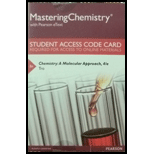
Mastering Chemistry with Pearson eText -- Standalone Access Card -- for Chemistry: A Molecular Approach (4th Edition)
4th Edition
ISBN: 9780134162485
Author: Nivaldo J. Tro
Publisher: PEARSON
expand_more
expand_more
format_list_bulleted
Concept explainers
Question
Chapter 22, Problem 37E
Interpretation Introduction
Interpretation: The molecule is a carbohydrate, classify it as monosaccharide, disaccharide, or trisaccharide carbohydrate.




Concept Introduction:
Carbohydrates are responsible for short-term storage of energy in living organisms, and they make up the main structural components of plants. Carbohydrates—as their name, which meanscarbon and water, suggests—often have the general formula
Expert Solution & Answer
Want to see the full answer?
Check out a sample textbook solution
Students have asked these similar questions
1. Which one(s) of these can be oxidized with CrO3 ?
(could be more than one)
a) triphenylmethanol
b) 2-pentanol
c) Ethyl alcohol
d)
CH3
2. Write in all the product(s) of this reaction. Label them
as "major" or "minor".
2-methyl-2-hexanol
H2SO4, heat
3) Determine if the pairs are constitutional isomers, enantiomers, diastereomers, or mesocompounds.
(4 points)
In the decomposition reaction in solution B → C, only species C absorbs UV radiation, but neither B nor the solvent absorbs. If we call At the absorbance measured at any time, A0 the absorbance at the beginning of the reaction, and A∞ the absorbance at the end of the reaction, which of the expressions is valid? We assume that Beer's law is fulfilled.
Chapter 22 Solutions
Mastering Chemistry with Pearson eText -- Standalone Access Card -- for Chemistry: A Molecular Approach (4th Edition)
Ch. 22 - Prob. 1SAQCh. 22 - Prob. 2SAQCh. 22 - Prob. 3SAQCh. 22 - Prob. 4SAQCh. 22 - Prob. 5SAQCh. 22 - Prob. 6SAQCh. 22 - Prob. 7SAQCh. 22 - Prob. 8SAQCh. 22 - Q9. Peptide bonds occur in which type of...Ch. 22 - Q10. How many nucleotides are required to code for...
Ch. 22 - 1. What is biochemistry? What significant advances...Ch. 22 - Prob. 2ECh. 22 - Prob. 3ECh. 22 - 4. What effect do double bonds have within the...Ch. 22 - Prob. 5ECh. 22 - Prob. 6ECh. 22 - 7. Describe the basic structure of phospholipids...Ch. 22 - 8. What is a steroid? List some functions of...Ch. 22 - Prob. 9ECh. 22 - Prob. 10ECh. 22 - Prob. 11ECh. 22 - Prob. 12ECh. 22 - Prob. 13ECh. 22 - Prob. 14ECh. 22 - Prob. 15ECh. 22 - Prob. 16ECh. 22 - Prob. 17ECh. 22 - Prob. 18ECh. 22 - Prob. 19ECh. 22 - Prob. 20ECh. 22 - Prob. 21ECh. 22 - Prob. 22ECh. 22 - Prob. 23ECh. 22 - Prob. 24ECh. 22 - Prob. 25ECh. 22 - Prob. 26ECh. 22 - 27. What is a codon? A gene? A chromosome?
Ch. 22 - Prob. 28ECh. 22 - Prob. 29ECh. 22 - Prob. 30ECh. 22 - Prob. 31ECh. 22 - Prob. 32ECh. 22 - Prob. 33ECh. 22 - Prob. 34ECh. 22 - 35. Draw structures showing the reaction of...Ch. 22 - Prob. 36ECh. 22 - Prob. 37ECh. 22 - Prob. 38ECh. 22 - Prob. 39ECh. 22 - Prob. 40ECh. 22 - Prob. 41ECh. 22 - Prob. 42ECh. 22 - Prob. 43ECh. 22 - Prob. 44ECh. 22 - Prob. 45ECh. 22 - Prob. 46ECh. 22 - Prob. 47ECh. 22 - Prob. 48ECh. 22 - 49. Draw each amino acid in its dipolar ion...Ch. 22 - 50. Draw each amino acid in its dipolar ion...Ch. 22 - Prob. 51ECh. 22 - Prob. 52ECh. 22 - Prob. 53ECh. 22 - Prob. 54ECh. 22 - Prob. 55ECh. 22 - Prob. 56ECh. 22 - Prob. 57ECh. 22 - Prob. 58ECh. 22 - 59. A phenylalanine amino acid on a protein strand...Ch. 22 - 60. An amino acid on a protein strand forms a...Ch. 22 -
61. The amino acid sequence in one section of a...Ch. 22 - Prob. 62ECh. 22 - Prob. 63ECh. 22 - Prob. 64ECh. 22 - Prob. 65ECh. 22 - Prob. 66ECh. 22 - Prob. 67ECh. 22 - Prob. 68ECh. 22 - Prob. 69ECh. 22 - Prob. 70ECh. 22 - 71. Determine the class of biochemical compound...Ch. 22 - Prob. 72ECh. 22 - 73. What is the difference between a codon and a...Ch. 22 - 74. What is the difference between a fatty acid...Ch. 22 - Prob. 75ECh. 22 - Prob. 76ECh. 22 - Prob. 77ECh. 22 - Prob. 78ECh. 22 - 79. Determining the amino acid sequence in a...Ch. 22 - Prob. 80ECh. 22 - Prob. 81ECh. 22 - 82. Calculate the mass percent of phosphorus in a...Ch. 22 - 83. The double helical structure of DNA disrupts...Ch. 22 - Prob. 84ECh. 22 - Prob. 85ECh. 22 - Prob. 86ECh. 22 - Prob. 87ECh. 22 - Prob. 88ECh. 22 - 89. Write the major equilibrium that is...Ch. 22 - Prob. 90ECh. 22 - Prob. 91ECh. 22 - 92. The genetic code is random, which means that a...Ch. 22 - Prob. 93QGWCh. 22 - Prob. 94QGWCh. 22 - Prob. 95QGWCh. 22 - Prob. 96QGWCh. 22 - Prob. 97QGWCh. 22 - Prob. 98DIA
Knowledge Booster
Learn more about
Need a deep-dive on the concept behind this application? Look no further. Learn more about this topic, chemistry and related others by exploring similar questions and additional content below.Similar questions
- > You are trying to decide if there is a single reagent you can add that will make the following synthesis possible without any other major side products: 1. ☑ CI 2. H3O+ O Draw the missing reagent X you think will make this synthesis work in the drawing area below. If there is no reagent that will make your desired product in good yield or without complications, just check the box under the drawing area and leave it blank. Click and drag to start drawing a structure. Explanation Check ? DO 18 Ar B © 2025 McGraw Hill LLC. All Rights Reserved. Terms of Use | Privacy Center | Accessibilityarrow_forwardDon't use ai to answer I will report you answerarrow_forwardConsider a solution of 0.00304 moles of 4-nitrobenzoic acid (pKa = 3.442) dissolved in 25 mL water and titrated with 0.0991 M NaOH. Calculate the pH at the equivalence pointarrow_forward
- What is the name of the following compound? SiMe3arrow_forwardK Draw the starting structure that would lead to the major product shown under the provided conditions. Drawing 1. NaNH2 2. PhCH2Br 4 57°F Sunny Q Searcharrow_forward7 Draw the starting alkyl bromide that would produce this alkyne under these conditions. F Drawing 1. NaNH2, A 2. H3O+ £ 4 Temps to rise Tomorrow Q Search H2arrow_forward
arrow_back_ios
SEE MORE QUESTIONS
arrow_forward_ios
Recommended textbooks for you
 ChemistryChemistryISBN:9781305957404Author:Steven S. Zumdahl, Susan A. Zumdahl, Donald J. DeCostePublisher:Cengage Learning
ChemistryChemistryISBN:9781305957404Author:Steven S. Zumdahl, Susan A. Zumdahl, Donald J. DeCostePublisher:Cengage Learning ChemistryChemistryISBN:9781259911156Author:Raymond Chang Dr., Jason Overby ProfessorPublisher:McGraw-Hill Education
ChemistryChemistryISBN:9781259911156Author:Raymond Chang Dr., Jason Overby ProfessorPublisher:McGraw-Hill Education Principles of Instrumental AnalysisChemistryISBN:9781305577213Author:Douglas A. Skoog, F. James Holler, Stanley R. CrouchPublisher:Cengage Learning
Principles of Instrumental AnalysisChemistryISBN:9781305577213Author:Douglas A. Skoog, F. James Holler, Stanley R. CrouchPublisher:Cengage Learning Organic ChemistryChemistryISBN:9780078021558Author:Janice Gorzynski Smith Dr.Publisher:McGraw-Hill Education
Organic ChemistryChemistryISBN:9780078021558Author:Janice Gorzynski Smith Dr.Publisher:McGraw-Hill Education Chemistry: Principles and ReactionsChemistryISBN:9781305079373Author:William L. Masterton, Cecile N. HurleyPublisher:Cengage Learning
Chemistry: Principles and ReactionsChemistryISBN:9781305079373Author:William L. Masterton, Cecile N. HurleyPublisher:Cengage Learning Elementary Principles of Chemical Processes, Bind...ChemistryISBN:9781118431221Author:Richard M. Felder, Ronald W. Rousseau, Lisa G. BullardPublisher:WILEY
Elementary Principles of Chemical Processes, Bind...ChemistryISBN:9781118431221Author:Richard M. Felder, Ronald W. Rousseau, Lisa G. BullardPublisher:WILEY

Chemistry
Chemistry
ISBN:9781305957404
Author:Steven S. Zumdahl, Susan A. Zumdahl, Donald J. DeCoste
Publisher:Cengage Learning

Chemistry
Chemistry
ISBN:9781259911156
Author:Raymond Chang Dr., Jason Overby Professor
Publisher:McGraw-Hill Education

Principles of Instrumental Analysis
Chemistry
ISBN:9781305577213
Author:Douglas A. Skoog, F. James Holler, Stanley R. Crouch
Publisher:Cengage Learning

Organic Chemistry
Chemistry
ISBN:9780078021558
Author:Janice Gorzynski Smith Dr.
Publisher:McGraw-Hill Education

Chemistry: Principles and Reactions
Chemistry
ISBN:9781305079373
Author:William L. Masterton, Cecile N. Hurley
Publisher:Cengage Learning

Elementary Principles of Chemical Processes, Bind...
Chemistry
ISBN:9781118431221
Author:Richard M. Felder, Ronald W. Rousseau, Lisa G. Bullard
Publisher:WILEY